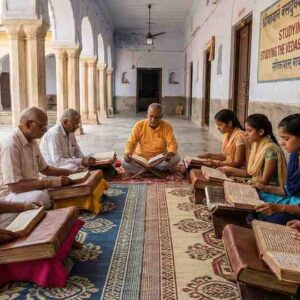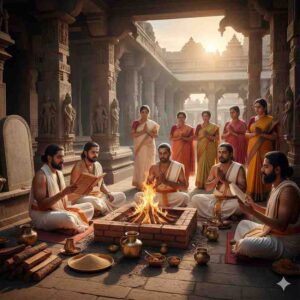Religion and philosophy, while often intertwined, offer fundamentally different approaches to understanding life and existence. Religion thrives onrituals and collective practices, offering a structured way to connect with the divine, while philosophy encouragesreflection and individual exploration, diving into abstract thoughts and rational inquiry. This dynamic contrast has shaped human civilizations for centuries.
Rituals in Religion: Anchoring Faith in Practice
Religion often manifests through rituals—structured actions performed with spiritual intent. These practices, rooted in tradition and sacred texts, foster a sense of community, continuity, and devotion.
Key Features of Religious Rituals:
- Tangible Expressions of Faith: Rituals like prayer, meditation, and festivals provide physical ways to connect with the divine.
- Community Bonding: Celebrations such as Diwali, Christmas, or Eid unite believers in shared experiences.
- Moral Discipline: Practices like fasting or charity instill ethical values and self-control.
- Cultural Identity: Rituals serve as markers of cultural heritage and social identity.
In India, rituals likeyajnas(sacrifices) andaarti(prayer offerings) exemplify how religion anchors spiritual beliefs in physical actions. According to a2021 Pew Research Study,80% of Indians actively participate in religious rituals, showcasing their enduring significance.
Philosophy: The Art of Reflection
Philosophy, on the other hand, focuses on thoughts rather than actions. It is an intellectual pursuit aimed at questioning, understanding, and interpreting the nature of existence, ethics, and knowledge.
Key Features of Philosophical Reflection:
- Rational Inquiry: Encourages questioning assumptions and analyzing beliefs.
- Individualistic Approach: Promotes personal exploration of truth and meaning.
- Dynamic and Evolving: Philosophical ideas adapt over time, reflecting new discoveries and contexts.
- Universal Scope: Seeks truths that transcend cultural and temporal boundaries.
Indian philosophy, through schools likeAdvaita VedantaandBuddhism, exemplifies this reflective approach, urging individuals to seek enlightenment through self-awareness and reason.
Comparing Religious Rituals and Philosophical Reflection
| Aspect | Religious Rituals | Philosophical Reflection |
| Nature | Physical and collective practices. | Abstract and intellectual inquiry. |
| Focus | Connection with the divine through tradition. | Understanding existence and truth through reason. |
| Expression | Rituals, prayers, and communal worship. | Debate, critical thinking, and written discourse. |
| Purpose | Spiritual fulfillment and community bonding. | Intellectual growth and individual enlightenment. |
| Flexibility | Bound by tradition and sacred texts. | Evolving and open to reinterpretation. |
Bridging Rituals and Reflection
While rituals provide a structured pathway to spiritual practice, philosophical reflection offers a deeper understanding of their significance. For example, Hindu rituals likemeditationhave philosophical underpinnings in texts like theUpanishads, blending practice with introspection.
The integration of both approaches is evident in texts like theBhagavad Gita, which combinesKarma Yoga(action) withJnana Yoga(knowledge), illustrating that rituals and reflection can coexist harmoniously.
Modern Relevance: Practice and Reflection in Balance
In today’s fast-paced world, balancing religious rituals with philosophical reflection is more relevant than ever:
- Mindfulness Practices: Rituals like meditation, rooted in both religious and philosophical traditions, are increasingly adopted to combat stress and promote mental well-being.
- Ethical Reflection: Philosophy encourages critical thinking about moral issues, fostering empathy and informed decision-making.
- Community and Individual Growth: Rituals offer a sense of belonging, while philosophy nurtures personal development.
For instance, practices like yoga, which blend the ritualistic and reflective, have gained global recognition for their holistic benefits.
Conclusion: Two Sides of the Same Coin
Religion as practice and philosophy as reflection represent two complementary pathways to understanding life. Rituals provide structure, community, and tangible connections to the divine, while philosophy offers the freedom to question, reflect, and explore deeper truths.
By integrating these approaches, individuals can cultivate a balanced perspective—grounded in faith yet open to inquiry—fostering both spiritual and intellectual growth in an ever-evolving world.










